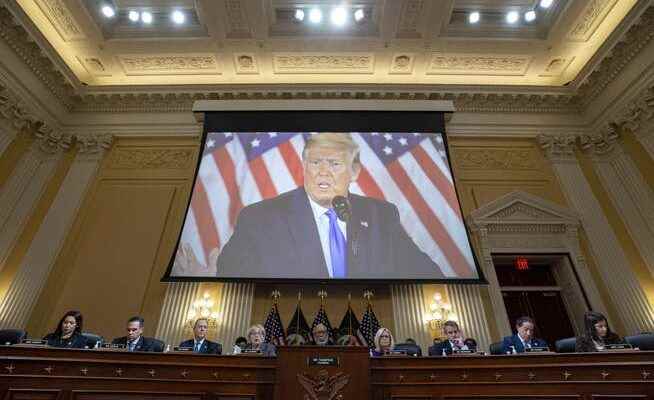At their last public meeting, parliamentary investigators voted to prosecute the former president. Among other things, they accuse Trump of having encouraged a revolt. Ultimately, however, the Justice Department decides on an indictment.
A video of Donald Trump is shown during the final meeting of the Capitol Inquiry Committee.
For a year and a half, nine members of the House of Representatives investigated Donald Trump’s plan to use dubious methods to overturn his November 2020 election defeat and stay in power. On Monday, in Congress at their last public session, they presented their full findings and conclusions on a significant date: on December 19, two years ago, Trump dropped the infamous tweet directing his supporters to a “wild” demonstration on January 6 invited to Washington.
According to the commission of inquiry, the tweet mobilized many of the violent extremists who stormed the Capitol on January 6, 2021. Before the protesters marched Trump shouted at them: «If you don’t fight like hell, you won’t have a country anymore.» Liz Cheney, deputy chair of the investigative committee, has therefore blamed the ousted president for the violence since the first of ten public hearings in June: “President Trump summoned the mob, gathered them and lit the flame for this attack.”
Recommendation for indictment in four counts
Now at the end of its investigation, the commission is convinced that the evidence it has collected is sufficient to bring Trump to justice. Representative Jamie Raskin put it most clearly: “We don’t have a justice system where the foot soldiers go to jail and the masterminds get a free pass.” Therefore, they would recommend that the Justice Department file charges against Trump and others on four counts: obstructing an official process, conspiring to defraud the US government, conspiring to make false statements, and aiding and abetting a revolt.
The Commission believes there is “more than enough evidence” for its recommendation, Raskin said. “The commission has produced significant evidence that President Trump intended to disrupt the peaceful transfer of power.”
According to observers, the easiest way is to prove that Trump has obstructed an official process. On January 6, it was the task of the assembled Congress, headed by Vice President Mike Pence, to certify the election result and thus also Joe Biden’s election victory. Trump put great pressure on Pence to the end so that he either postpones the certification or exchanges electoral votes for Biden with those for him. Because his vice stood firm, Trump fueled his supporters’ anger at Pence.
After rioters broke into the Capitol at around 2 p.m., lawmakers were forced to adjourn their session and flee to safe shelters. They were only able to certify the election result late in the night.
The accusation of revolt – insurrection – is based on a paragraph that provides for prison sentences of up to ten years and prohibits the convicted person from holding public office. An indictment would have to show Trump that he aided or abetted a rebellion. To what extent Trump endorsed the violence and let it happen is a crucial question. According to witnesses, the president-elect knew that some demonstrators were armed on January 6th. Only at the insistence of his daughter Ivanka should he the words “stay peaceful” weathered to have. However, Trump did not release the video in which he called on his supporters to go home until two to three hours after the storm began.
Department of Justice decides
In addition to the immediate events of Jan. 6, the commission also looked into Trump’s weeks of pressure on local officials and the Justice Department to cement his lie of a rigged election. Raskin recalled a ruling by Federal District Judge David Carter in October regarding the emails from law professor John Eastman. He is considered the real mastermind behind Trump’s multi-part plan to turn the election defeat into a victory. The correspondence shows that the president-elect was aware that his allegations of voter fraud were false, Carter wrote. Nonetheless, he held on to them and this constituted a conspiracy to defraud the United States.
In another judgment, Carter had already described the actions of Trump and Eastman as a “coup in search of a legal theory”. The commission of inquiry therefore recommends that the Justice Department also bring charges against Eastman and others. The investigators deliberately left open who exactly is meant. Your final report, from which on Monday only a small part was released, name several other individuals who helped Trump achieve his “criminal goals,” Raskin said. But your list may still have gaps because several people have refused to testify. “We trust that the Justice Department will be able to paint a far more complete picture through its own investigation.”
Ultimately, the parliamentary commission of inquiry can only make recommendations. Ultimately, the decision on indictments must be made by the Justice Department. Because Trump wants to run for the presidency again in 2024, Attorney General Merrick Garland is in a difficult situation as a member of Joe Biden’s administration. Garland has therefore appointed Jack Smith, a special investigator who is to make a decision on charges at the end of his work. But Garland could also override this.
Regardless, charges against Trump should be made soon. Because the closer the 2024 election date gets, the more delicate a court case would become. It could also take months from the time an indictment is filed to the first negotiations. Regardless, the commission’s recommendations for Trump’s planned comeback are bad news. Even if they have no legal force, they are a political burden on Trump.
